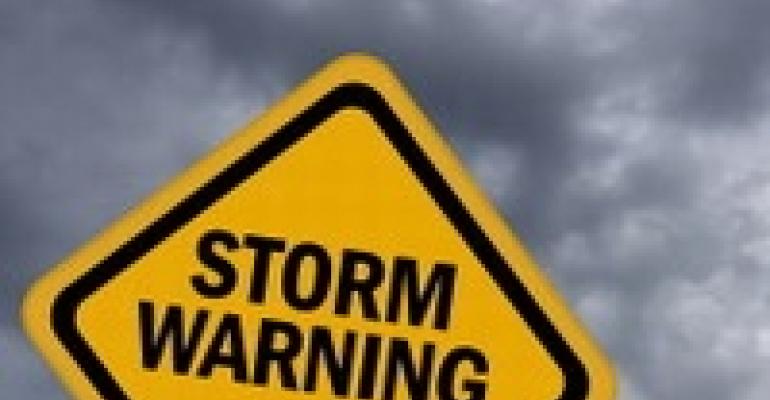
Three groups involved in the deadly stage collapse at the Indiana State Fair last summer were fined last week by the state's labor officials. The biggest fine--$63,000—was levied against Mid-American Sound Corp., which built the stage and leased it to the state fair. Officials said the company "was aware of the appropriate requirements and demonstrated a plain indifference to complying with those requirements."
The state fair commission was hit with a $6,300 fine for its "failure to conduct an adequate life safety evaluation and plan prior to the event," officials said. The labor union local was fined $11,500 for failure to ensure that the load-bearing roof was properly secured.
In August, hit band Sugarland was about to perform at the fair when the stage fell down, killing seven people and injuring 58.
Read more about the stage collapse here.
SAFETY IN THE SPOTLIGHT
Some staging experts interviewed by Special Events think the mixture of fines and bad publicity since the Indiana disaster have put a renewed focus on safety at special events.
"I don’t feel that the fines are high enough to really hurt anyone--however, the lawsuits that follow will probably sting a bit," notes David Smith, owner of Los Angeles-based ShowPro. "It's interesting that the producers of the event—the state fair commission--took the lowest hit in terms of fines. Sadly, it seems that regulation needs to come from the top down when you have vendors that are not successfully self-regulating.”
Veteran event specialist Bob Estrin, based in Orange, Calif., points to Indiana's new regulations covering stages as the most important outcome so far. "More important [than the fines] was the legislation requiring stages to have permits and inspection even when on state property," Estrin says. He adds, "Most states already have permit and inspection requirements in place."
Stephen Frost, president of Stamford Tent & Event Services of Stamford, Conn., has "absolutely" seen an increase in safety awareness since the stage collapses of last summer, which also included a falling stage at Ottawa's Bluesfest in July. Not only are more local officials getting involved in the process, he says, but also, "Some clients are now insisting on a licensed structural engineer to sign off on the installation."
WHEN COST-CUTTING CUTS SAFETY
However, Frost criticizes the pressure from event producers to cut costs at the expense of ensuring safety.
"Event producers need to focus on safety over cost," he says. "Too often, we see these bids awarded to companies that don’t have a concern about safety, nor do they have the knowledge or experience to even produce the job correctly. Price should be a secondary consideration--not the primary focus."
Smith urges event promoters not to cut corners. "Please, hire a technical director, get all structures engineered, and build your rigs exactly as they were engineered," he says. "If a piece of ballast that helps hold down a stage roof is inconvenient for guest flow, then change the flow of the guests--don’t move the ballast."
Greg Poulos, head of Belmont, Mass.-based Bluefin Productions, says that safety can't be ensured at events unless top management commits to it.
Although Poulos stresses that he was not at the Indiana State Fair when the stage collapsed, "During the event, there was no one in the chain of command who made safety of the audience and performer their responsibility," he says. "A production manager is responsible for the safety of the technicians, the performers and the audience at an event. A good production manager will manage that risk and liability, and will ensure the equipment and installation happen in the safest way. An experienced production manager will stand up to the promoter, and speak 'no' to power when need be if conditions are dangerous."
THE SHOW MUST NOT GO ON
Several of the event pros interviewed warn that the legendary determination of the special event industry to persevere in the face of adversity can itself be a threat to safety.
"I have over 30 years of special events--indoors, outside, small, medium and large events," Poulos says. "I have taken training from a variety of places, including FEMA courses in incident command for single incident, multiple-hazard planning and, most importantly, special events contingency planning for public safety. None of this means anything unless we all agree to work towards the safety and success of events over the pressure of the promoter and 'the show must go on at all costs.'"
EVENT SAFETY ALLIANCE LAUNCHES
It may be that the staging industry is beginning to take self-regulation more seriously. Last month brought the official launch of the Event Safety Alliance. The alliance is a group of entertainment professionals now assembling technical and product information with the goal of establishing formal guidelines to improve safety at live events across the U.S. Founding members include representatives from Clair Global, TOMCAT USA and Doodson Insurance Brokerage.
Says ESA spokesperson Linzi Corrigan, "We felt a responsibility, as the cornerstones of the live event production industry, to step up and work collaboratively to make changes. Recent tragic events around the world relating to structural collapses at entertainment venues have made it apparent that a clearly defined set of systems is long overdue. Our role as the ESA will be to reach out to our peers in the industry and create a universal language that will apply to all aspects of event production."
Membership in the organization is free.
Smith applauds the move toward self-regulation.
"I think that all of us in the private special event industry need to make sure we are self-regulating before there are more deaths and injuries and regulatory intervention that will make the cost of doing events skyrocket," he says. "But better an over-regulated industry than an unsafe one."
Photo by iStockphoto.com / © Arkadi Bojaršinov
RELATED STORIES FROM SPECIAL EVENTS
Event Experts Debate Whether Collapsing Stages Can be Prevented
Event Experts Share Tips After Bounce House Blows AwayTent-handling Practice that Killed 3 is Common, Tent Renters Say





